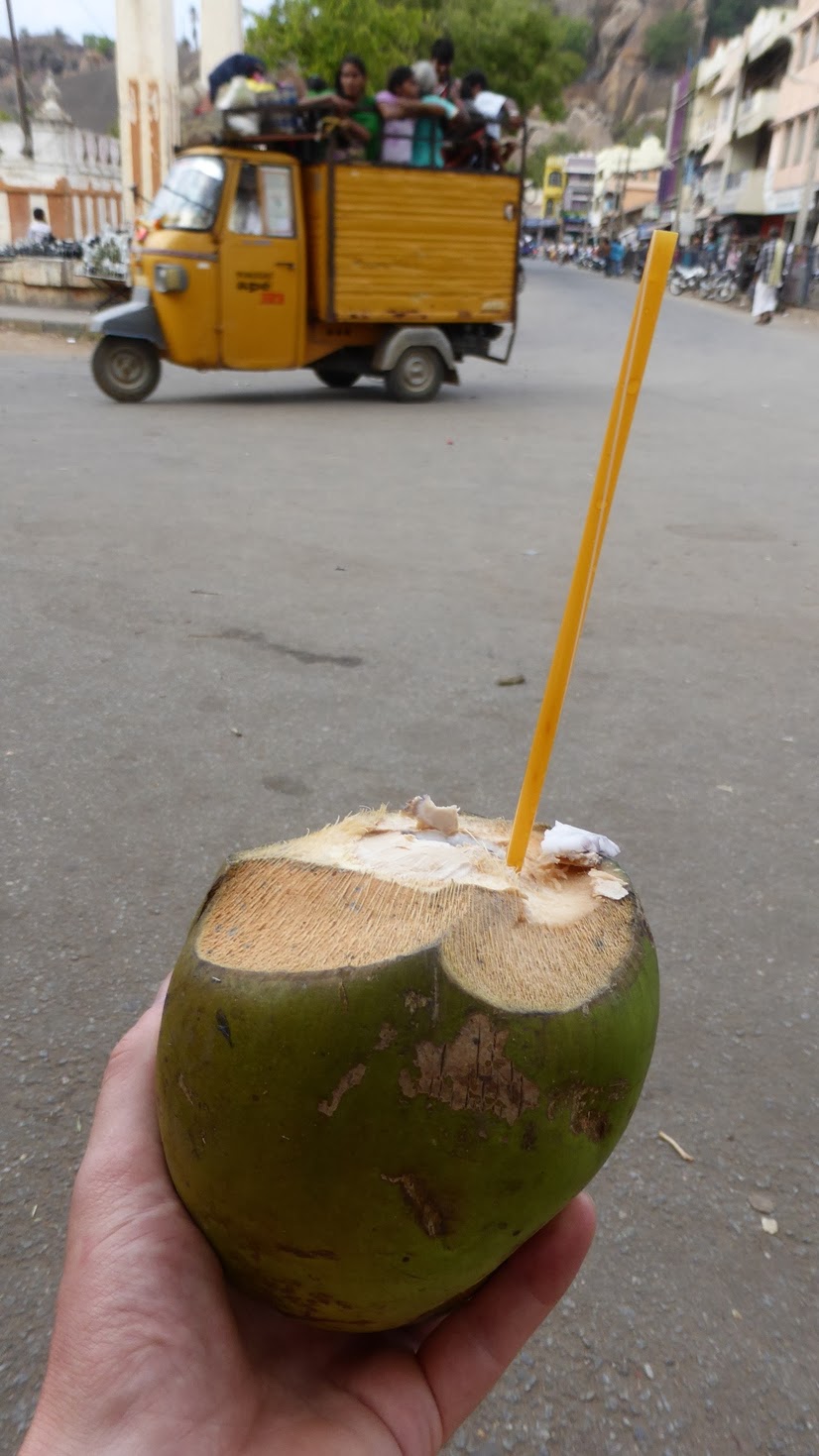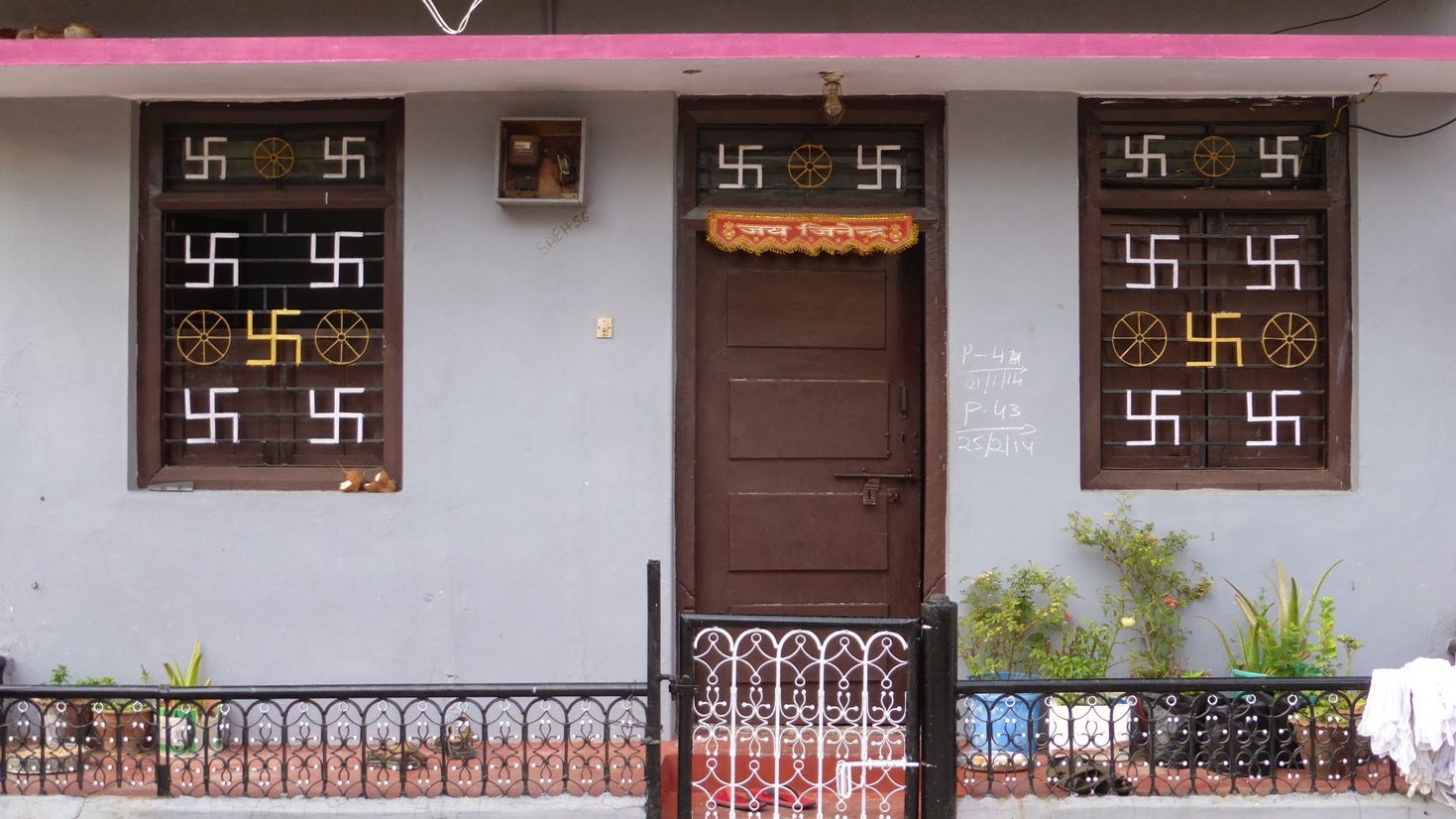In this blog: a 450 year old corpse, gigs and parties on the beach, a cooking course and a spot of cycling.
------------------------------------------------------------------------------------------
After a nice, but slightly dull few days in Vagator in North Goa, I headed to the South Goa coastal village of Palolem - known as a bit of a hub for independent travellers. Like the previous week or so in North Goa, most days in Palolem seemed to revolve around walking, swimming, lazing on the beach, hanging out in beachside cafés, reading, podcasts and meeting people - good to do, but pretty boring to read about so I've tried to cut it down to a few highlights below.
 |
| Palolem beach - nearly paradise |
Palolem is a place of outstanding natural beauty, though slightly ruined by development over the past twenty years or so. Compared to other parts of Goa it's better looked after however, with the council banning hawkers from flogging stuff, keeping the con men away, and picking rubbish daily so it's not all bad. It also seems to be quite literally Little Britain - I've not come across so many Brits since I left home. Some on holiday, some spending the winter there. Most of them nice, but I came across a few less desirables such as an ex-con couple and some lager louts. On the whole I loved the place though - not over busy by day, but busy enough by night.
I arrived knowing no-one, but managed to meet quite a few people over the week, to the point that after a short wander along the beach of an evening I always came across someone I knew to hang out with - a nice experience after several quieter weeks on the social front. A mix of English, Scots, Germans and French mostly, with the odd Dane, Swede, Indian and Ukrainian thrown in for good measure.
15th Feb
Started the day in Vagator with an Indian breakfast I'd had every day for the past week - Poori Bhaji. This consists of a doubled up roti bread which is deep fried so it comes out as big puffy discs, and is served with a non-spicy veg curry. Using your fingers, and trying not to burn them at first, you tear strips from the bread, double it up and pinch the veg between - in the manner you do with many Indian dishes. A great breakfast which really keeps you full for hours.
Leaving Vagator, I set off heading south to Palolem. Despite it being less than seventy miles away, this involved taking six different buses but unbelievably for India, I didn't have to wait more than a minute for the next one to depart each time, what are the chances of that I thought?
 |
| Cathedral at Old Goa |
 |
| Coffin of St Francis Xavier |
I did a little detour along the way to a town called Old Goa - the former capital of the region of Goa when it was a Portuguese colony, but mostly abandoned in the seventeenth century due to cholera outbreaks. As I was en-route to Palolem, this meant spending two hours walking round with my heavy main backpack as there was nowhere to leave it - not the most pleasant of things in a breezeless 32° sunny day I tell you! The buildings were all typically Portuguese in style and interesting to see, but the most interesting part was the Basilica of Bom Jesus - a church where the body of St Francis Xavier is kept in a glass sided coffin resting on a plinth. Despite dying hundreds of years ago, his body 'miraculously' stayed well preserved (though fairly shrivelled now), and bizarrely they open it up and carry it through the streets every ten years for everyone to see. He is however missing a toe which someone curiously bit off, and an arm which was given to the Pope as a gift!
 |
| Digs |
Arriving late afternoon in Palolem, I walked a mile or two from an inland village to the coast with a recently married British couple from the bus, who are travelling India for a few months as their honeymoon, nice idea. My digs this time were as simple as it comes - a small bamboo and palm leaf hut raised on stilts, set amongst other huts about twenty metres from the beach, with only an outside toilet and cold shower - basic but fantastic.
I headed out along the beach that evening, which in between the swaying palm trees is lined with many restaurants. The evening started a bit dull, having tea in a place full of ignorant London geezaas watching Premiership football. Moving on I found a venue with a live band playing, and got talking with a guy at the bar who I thought was English due to his near-perfect English accent, but turned out to be a German guy called Hans (what else?!) who'd lived in England for eight years. A 48 year old train driver, like many people here he comes to Palolem on holiday every year so knows it inside out, and thereafter I ended up bumping into him most evenings at the various gigs and parties that happened around town.
16th Feb
Elsewhere in India you often wake up in the morning (or night) to the sound of traffic, beeping and shouting. In coastal Palolem though, it's sometimes cockerels calling, wild boar snorting, and crows crowing, or on my first morning there - the sound of waves crashing in on the beach nearby - not the worst wake up call.
Near to my hut was a slackline tied between two trees about a foot from the ground - a bit like a tightrope, except a fabric strap. Along with a French guy, we had a go at learning to walk it later that day. At first it was a pretty disastrous effort, but we slowly got better, eventually both being able to do nine or ten steps until it got too bouncy in the middle and we could go no further. I really enjoyed learning a new skill and spent a little bit of time on it every day though never got that good - the circus hasn't called yet anyway.
In the evening, a live reggae band were performing at the end of the beach at a busy venue in a little cove surrounded by palm trees - a perfect location. The music was fairly average, but I hung out with the English couple from the day before and it turned out a pretty fun night nonetheless.
17th Feb
 |
| Cooking course |
After another day on and around the beach, I booked to do something different - an Indian cooking course. I've eaten so much Indian food now, it would be sacrilege to keep using those crappy jars of sauce from the supermarket when I eventually get home. I also thought it would be a good way to meet people, maybe even some girls for a change. No such luck - the group comprised an Irish couple, and three gay English/French guys!
The dishes on the cards were butter chicken, fish byriani, mushroom masala, chicken vindaloo and chapatti bread. Rahul the instructor was very good - down to earth, patient and knowledgable, and at different times either split the group in two, or gave us individual tasks to do - chopping, stirring, adding spices etc. Indian cooking turned out to be quite complex, for me anyway, involving a huge range of spices and many steps - often the meat and certain veg and spices are cooked separately then combined at the end. I see Indian cooking as 'modular cooking' - many of the different dishes are from the same ingredients, but just made using different quantities and methods. It was good fun and pretty interesting, even for someone who generally hates cooking, but there were two especially good bits at the end - 1) we didn't have to wash up, and 2) we got to eat it all! And very good it was.
Our group got on well, and went for a drink afterwards, also meeting-up with some French friends of theirs who I got talking to. After just a few minutes, one of the girls - Aurelie - said to me 'so what do you think about French people?'. Oh hang, sensitive subject. I hesitated, trying to think of a diplomatic answer, and she laughed knowing this. All the French people I've met whilst travelling are first of all very nice, but also quite aware of the tendencies of some of their fellow countrymen, and I carefully explained my view before she fortunately smiled and agreed.



























































